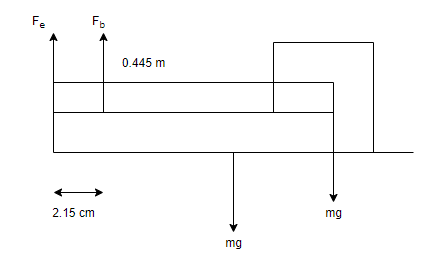The bones of the forearm (radius and ulna) are hinged to the humerus at the elbow. The biceps muscle connects to the bones of the forearm about 2.15 cm beyond the joint. Assume the forearm has a mass of 2.35 kg and a length of 0.445 m. When the humerus and the biceps are nearly vertical and the forearm is horizontal, if a person wishes to hold an object of mass 6.55 kg so that her forearm remains motionless, what is the force exerted by the biceps muscle?
The bones of the forearm (radius and ulna) are hinged to the humerus at the elbow. The biceps muscle connects to the bones of the forearm about 2.15 cm beyond the joint. Assume the forearm has a mass of 2.35 kg and a length of 0.445 m. When the humerus and the biceps are nearly vertical and the forearm is horizontal, if a person wishes to hold an object of mass 6.55 kg so that her forearm remains motionless, what is the force exerted by the biceps muscle?
Related questions
Question
The bones of the forearm (radius and ulna) are hinged to the humerus at the elbow. The biceps muscle connects to the bones of the forearm about 2.15 cm beyond the joint. Assume the forearm has a mass of 2.35 kg and a length of 0.445 m. When the humerus and the biceps are nearly vertical and the forearm is horizontal, if a person wishes to hold an object of mass 6.55 kg so that her forearm remains motionless, what is the force exerted by the biceps muscle?
Expert Solution
Step 1
Consider the following free body diagram:

Trending now
This is a popular solution!
Step by step
Solved in 3 steps with 1 images
